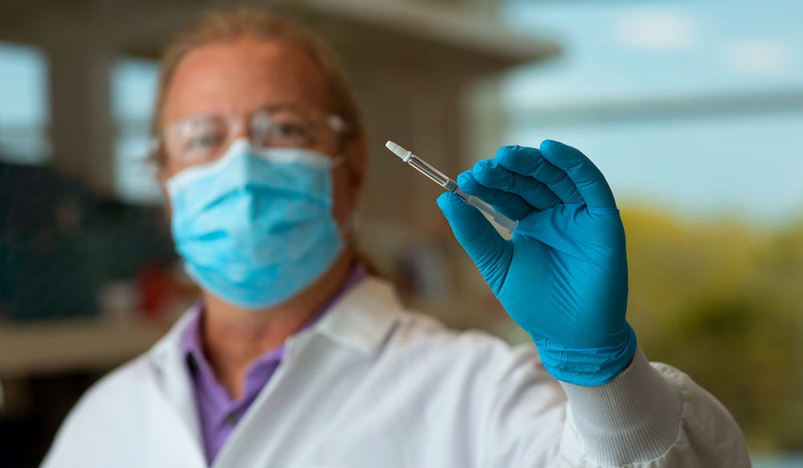
Meissa is developing a nasal vaccine against COVID-19.
If we could vaccinate your nose, there's a good chance we'd be able to end this pandemic right now.
But the COVID-19 shots available in the US can't control everything that happens in your nostrils. If they did, they might be able to stop all transmission of the virus that happens through our talking, singing, laughing, breathing, and sneezing around each other.
If successful, a new kind of vaccine — a nasal mist that requires no needle — promises to do all that by providing the special kind of coronavirus immunity people need to stop shuttling this virus around.
"An intranasal vaccine could help bring an end to the pandemic and help give us true control over SARS-CoV-2 by limiting infection and transmission," said Marty Moore, the CEO of Meissa Vaccines. "We shouldn't settle for a new normal. We can get back to the old normal."
For now, that idea remains one that needs much more robust clinical data behind it to become a reality that we could all sniff up. But the prospect is still quite exciting to many immunologists around the world.
One big reason vaccine breakthrough infections happen is because the injectable COVID-19 vaccines have been designed to give a person's body good systemic immunity against the virus, protecting internal organs such as the lungs and the heart from severe infection. But a shot in the arm can't do as much for your nose in the long run.
If a vaccinated person is exposed to COVID-19, they may still get a case of the sniffles, or a flu-like COVID-19 illness. This is because they haven't developed great mucosal immunity against the coronavirus. In other words: They're still susceptible to infection via the vulnerable moist tissues that interact with the outside world, such as those in the nose, eyes, and mouth.
"Very early on during that honeymoon initially after vaccination when your neutralizing antibodies are at their highest, you get a bit of a spillover effect into the upper airway," Dr. Céline Gounder, an infectious-disease specialist at Bellevue hospital in New York, said at the recent IDWeek infectious-disease conference, explaining the issue of lacking durable mucosal immunity after vaccination.
Gounder, and many other leading infectious disease experts, including Dr. Stanley Perlman who's on the FDA's vaccine advisory committee, have lamented that there isn't a nasal or oral COVID-19 vaccine in late-stage trials. We have to "find another way to elicit a mucosal response to complement the systemic immune response" people get from needle-in-the-arm vaccines, Gounder said. And nasal vaccines could be the answer.
Meissa is one of a few smaller companies pursuing COVID-19 nasal vaccines in early-stage human trials. Codagenix, another US company, has also announced some promising (but extremely small) early trial results. Other nasal vaccines are being developed around the world, with ongoing trials in Israel, Russia, Cuba, India, Hong Kong, and Iran.
"Our aim is to be the transmission-blocking COVID vaccine," Moore said.
Meissa's early clinical data (which the company said it would share in more detail at an upcoming immunotherapy conference in late November and early December) indicated that unvaccinated patients who are given a couple drops of Meissa's vaccine in each nostril have average mucosal antibody levels slightly higher than those measured in people with natural immunity to the virus.
This suggested that Meissa's vaccine could potentially work well at preventing peskier sniffly infections, not just the COVID cases that land people in the hospital.
"It suggests that we can deliver immunity that's like natural infection, but we can do it safely," Moore said.
This prospect has many immunologists quite excited, not only because nasal vaccines could be offered to vaccine-hesitant people who don't like shots but also because they might, perhaps, be used as boosters to top up the already very good systemic immunity people have gotten from injectable vaccines.
Meissa's initial human trial is still ongoing, with 70 participants in it so far. It's only in phase 1, meaning any approval or even emergency authorization for this type of vaccine is many months and likely several thousand more volunteer participants away, at best.
But so far, the results look good. Meissa, which is conducting much of its research in Kansas, said there were many reasons people have chosen to join their early-stage trial.
"Sometimes it's people who are Ph.D.s or highly educated, who see the benefit of an intranasal to prevent infection itself," Moore said. "And oftentimes, it's people who just don't want a shot. They don't want something injected into them."
Common side-effect complaints after Meissa's nasal vaccine so far have included runny noses, coughs, sore throats, and headaches. But the company said that no worrisome safety signals had surfaced with the vaccine, which uses a live-attenuated RSV platform to deliver the coronavirus' characteristic spike protein to vaccinees without risking the coronavirus itself spreading from them.
"There are quite a few people who would rather have drops in the nose than the needle," Moore said. "So I think an intranasal vaccine could reach not all, but many vaccine-hesitant people."
SOURCE: Business Insider
.jpg)
Qatar Secures Place Among the World's Top 10 Wealthiest Nations
.jpg)
Hamad International Airport Witnesses Record Increase in Passenger Traffic

Saudi Arabia: Any visa holder can now perform Umrah

What are Qatar's Labour Laws on Annual Leave?
Leave a comment